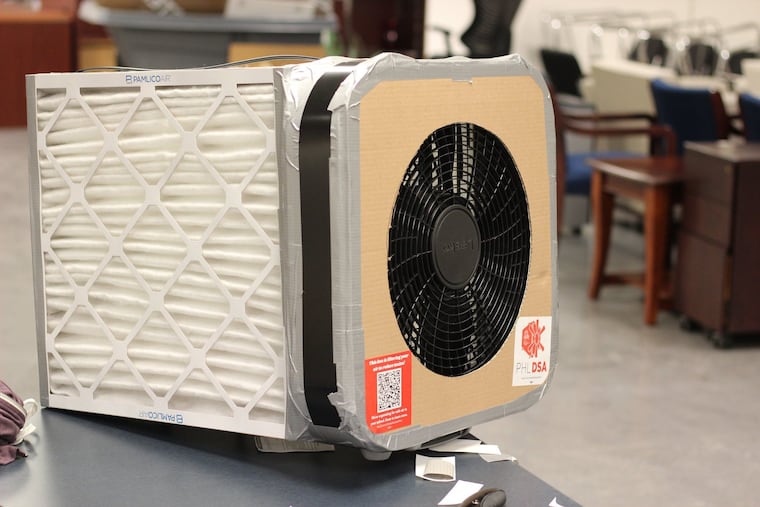These parents are making DIY air purifiers for Philly schools. They want one in every city classroom.
"This is a necessary mitigation that we need as soon as possible, but it doesn’t get anyone off the hook for the bigger problem," district parent Lizzie Rothwell said.

With pleated air filters, fans, boxes, and duct tape, a group of Philadelphia parents and community members is taking what it hopes are first steps toward better air quality inside all city public schools.
Some members of the Philadelphia Democratic Socialists of America have begun building Corsi-Rosenthal boxes — DIY air purifiers that have gained mainstream acceptance as low-cost, effective tools to remove potentially dangerous substances, like viruses and mold, from indoor spaces.
The aim, the group said, is to make schools better.
“Poor air quality in our schools causes drowsiness, inattention and lower test scores, and contributes to Philadelphia’s high childhood asthma rates, which are double the national average,” a petition now being circulated by Philly DSA declares. “The 2021-2022 school year showed that COVID-19 can spread readily in poorly ventilated school buildings.”
Over the summer, groups built 20 of the boxes, which cost about $75 each; most of them are currently in Philadelphia School District classrooms where teachers agreed to place them. But the group has larger-scale ambitions.
» READ MORE: Make this DIY air filter to (possibly) reduce your indoor exposure to coronavirus
The group estimates it would cost the district about $750,000 to place the air-filtration devices in each of its classrooms. The school district, with 114,000 students and 300 buildings, many of which are over 75 years old, is coping with billions in unmet facilities needs.
Those unmet needs often include poor ventilation systems. Some rooms lack any mechanical ventilation whatsoever.
“Nobody thinks that there’s a DIY way to fix our facilities,” said Lizzie Rothwell, a district parent leading the project. “This is a necessary mitigation that we need as soon as possible, but it doesn’t get anyone off the hook for the bigger problem.”
Rothwell plans to testify before the school board Thursday night.
A school district spokesperson had no immediate comment.
The campaign has its roots in a carbon dioxide monitor Rothwell bought and stored in her child’s backpack last year as a way to monitor indoor air quality in schools during the pandemic. Eventually, Philly DSA bought more CO2 detectors and spot-checked air quality at several schools.
Three students at Franklin Learning Center, a district magnet, used data they gathered with the CO2 detectors as the basis of their senior project. They concluded that CO2 levels were high and suggested the district needed to work on their school’s air quality, though no action was taken.
What, Rothwell and others thought, if they went bigger?
“At the end of last year, we were definitely feeling like all we do is monitor and point out problems,” said Rothwell, an architect with children at Lea Elementary in West Philadelphia. “Given that there is a known solution, how much is that enabling the district to then do something about it themselves?”
After COVID-19 hit and schools shut down for in-person learning, the school district first said it would use window fans to mitigate virus spread, but was roundly criticized for that solution. Instead, it spent $4.5 million on air purifiers for every classroom, but experts said the purifiers were ineffective at best and harmful at worst.
The boxes will address more than just the potential spread of the COVID virus, Rothwell said. Many city schools cope with asbestos and mold issues.
The group has plans to build more Corsi-Rosenthal boxes in the coming weeks, and to potentially work with a school community for a large-scale build.
“This is an across-the-board good,” Rothwell said.